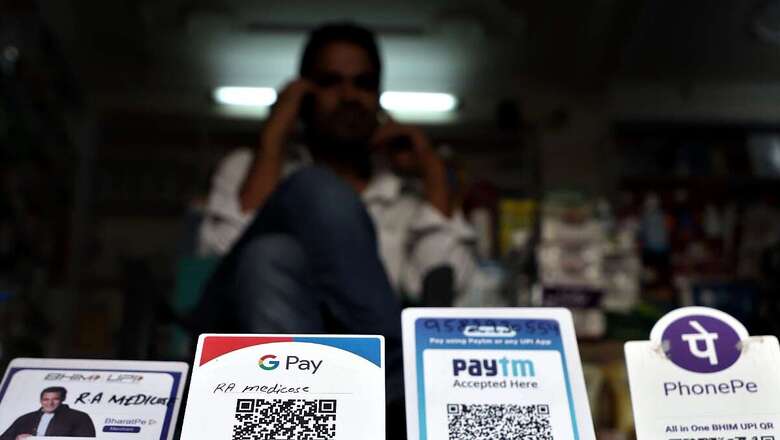
views
The proliferation of fintech is quietly engendering a gigantic revolution in India. Fintech, an abbreviation for financial technology, pertains to the application of technological advancements and innovative approaches within the financial services sector. This burgeoning industry is rapidly reshaping conventional paradigms of conducting business in the realm of finance. Examples of fintech include mobile payment apps, financial planning, asset management, and online lending platforms.
It is always gratifying to witness India ascend to the zenith of rankings concerning positive indicators that hold global implications. Hence, it is heartening to observe India and China vie for pre-eminence in the realm of consumer adoption of fintech. According to EY’s Fintech Adoption Index 2019, India has achieved an impressive 87 percent rate of fintech adoption across 27 markets. To contextualise this figure, the global average for fintech adoption stands at 64 percent. Furthermore, large nations such as the United States, the United Kingdom, and Canada demonstrate adoption rates of 46 percent, 71 percent, and 50 percent, respectively.
Comparatively, EY’s Fintech Adoption Index 2017 revealed India’s prior adoption rate to be 52 percent, thereby signifying a momentous leap over the course of two years. The growth trajectory of India’s fintech adoption is believed to have persisted over the past four years. Standing in long queues for banking services is becoming a thing of the past. In contemporary India, individuals can effortlessly open bank accounts, execute domestic and international money transfers, settle bills, and indulge in online purchases, all while relishing an enthralling Indian Premiere League (IPL) cricket match.
The easiest way to internalise the adoption of fintech is by thinking about how often we use cash on a day-to-day basis. These days, you can pay online for almost all commodities including, but not limited to, groceries, food, school fees, and hospital treatments. Pioneered by the National Payments Corporation of India (NPCI), the ground-breaking Unified Payment Interface (UPI) platform has empowered Indian consumers to seamlessly conduct mobile payments in their quotidian transactions. Through a mobile application or web portal, the UPI expeditiously facilitates the transfer of funds between bank accounts. Prominent UPI applications, such as Paytm, Amazon Pay, Google Pay, PhonePe, and Samsung Pay, have emerged as exemplars of this technological innovation. Notably, the UPI platform boasts robust security features, including two-factor authentication and encryption protocols, thereby ensuring the inviolability of users’ financial information.
Moreover, it is available 24/7 including bank holidays, thus enabling individuals to effortlessly seek reimbursement from acquaintances for, say, a thousand rupees borrowed on an arbitrary Friday. More recently, offline access to the UPI platform has been instituted, heralding a new epoch of convenience and adaptability. The profound transformation of peer-to-peer and consumer-to-business monetary transactions stands as one of the most significant triumphs engendered by the fintech sector in India.
An additional noteworthy facet within the realm of fintech pertains to the domain of financial planning. Many Indians use a personal financial management (PFM) app to manage their money. Through these PFM apps, the integration of various bank accounts becomes feasible, thereby facilitating comprehensive expense tracking, budgetary oversight, security provisions, and bill payment reminders. Moreover, these apps offer the capacity to establish financial objectives and monitor progress towards their attainment. By virtue of accessing a consolidated view of transactions across all bank accounts, users gain invaluable insights into their expenditure patterns, enabling them to employ such information judiciously when crafting a budget.
No discourse concerning fintech would be complete without a discussion about investments. Conventional wisdom dictates that individuals should consistently set aside a portion of their income for investment purposes. The most affluent denizens of the world have typically attained their status by assuming the mantle of CEO or CFO within a Fortune 500 enterprise and/or through judicious investment strategies. The latter, indeed, fall within our purview of control. Investment represents an indispensable facet of personal financial planning, serving to cultivate wealth and secure one’s financial future. That is where a personal finance app that has investment tools can help.
The initial quandary encountered on the investment journey pertains to the selection of suitable investment avenues. Fintech empowers investors with real-time access to comprehensive investment data. Furthermore, it enables the monitoring of investment portfolios, vigilance over market fluctuations, and the provision of notifications in the event of notable surges in specific stocks or bonds. Additionally, the consolidation of all investment-related information within a singular platform proves immensely advantageous, fostering the cultivation of sound investment habits through the dispensation of sound investment advice.
In the course of India’s journey towards embracing fintech, certain impediments persist. Notably, there exists a segment of the Indian populace devoid of access to bank accounts, while inadequate internet connectivity plagues certain regions, rendering cash transactions the preferred mode of exchange. Furthermore, the elderly population encounters challenges in relinquishing entrenched habits reliant on cash-centric practices. Extending empathy and providing support to these individuals during their endeavour to embrace fintech represents the final impetus required to forge a more promising future.
Akshay Srinivasan, as a software engineer and Purdue University graduate, is well-versed in the field of technology with an interest in mental health, cricket, and football spaces. Views expressed are personal.




















Comments
0 comment